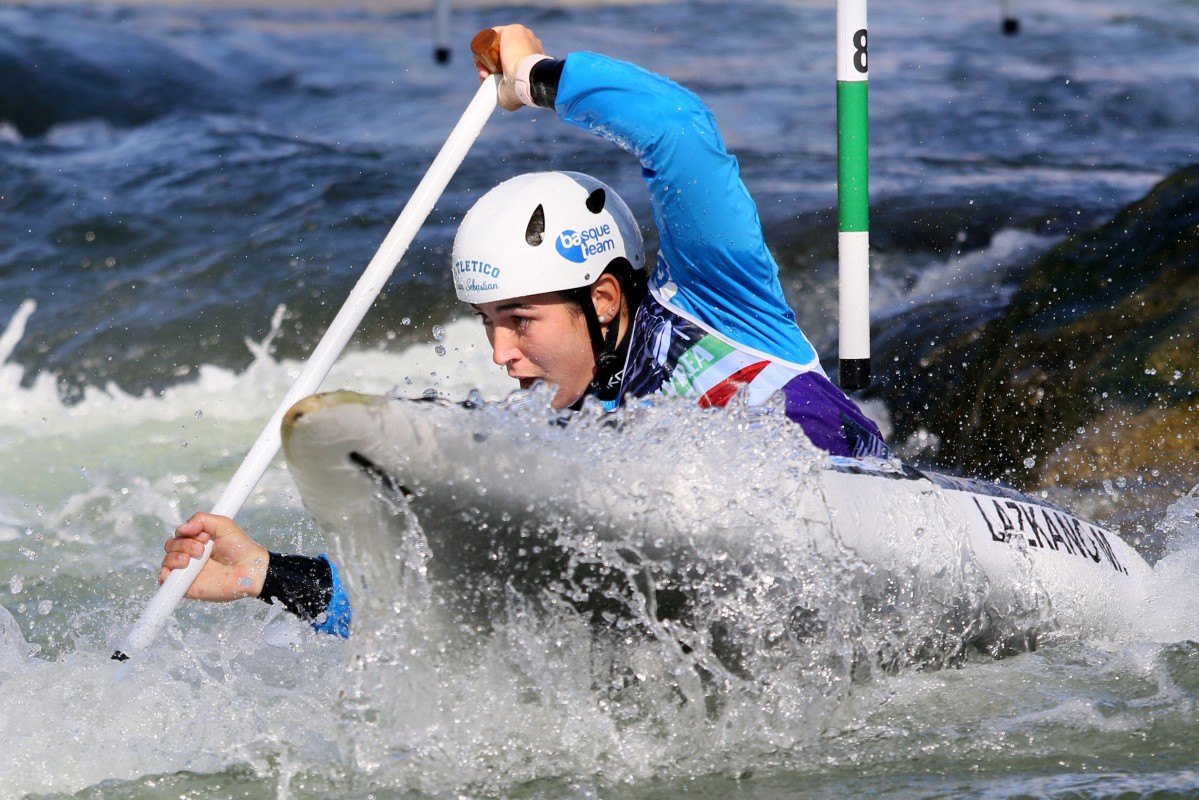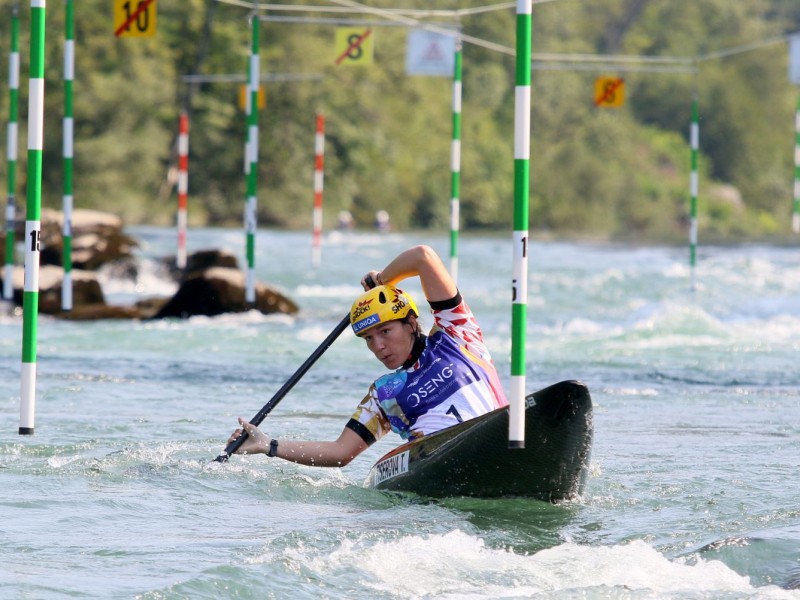The Women in Canoe Sport project, which is financially supported by the Erasmus+ Sport (Small Collaborative Partnership) grant, and whose provider is the European Union (European Education and Culture Executive Agency – EACEA), is based on international (Czech-Slovak-Swedish) cooperation of experts from the Faculty of Physical Education and Sport of Charles University in Prague, the Czech Canoe Association, the Slovak Canoe Association and the Swedish club Falu Kanot Klubb.
The aim is to create a methodical, educational, motivational and discussion platform for training women and girls in canoeing (especially in canoe slalom) and to try to increase the inclusion of girls among the competitors (recruitment) and women as coaches, members of the implementation teams and volunteers.
To this end, they have set up a website
www.womenincanoesport.com to which they are continuously adding gradually emerging professional materials and which is linked to the project's social networks (Instagram: @womenincanoesport2023; Facebook: Women in Canoe Sport).
To recruit and actively support girls in canoe slalom, they will organise three training camps. The dates can be found on the project's website. The new female coaches, adult female competitors, experienced coaches, physiotherapists, nutritionist, recovery specialist, psychologist-medical doctor and others will work with the participants.
The ambassador of the project is the Czech Olympic athlete Tereza Fišerová, who will participate in the training camps depending on her time possibilities given by her competition program. In addition to the professional consortium, a number of volunteers from the countries mentioned above, as well as from Canada, Spain, and Australia, are involved in the project.
The project is also funding the opportunity to participate in scientific measurements at the ICF World Ranking Race in Troja, Prague, on 29-30 July 2023. All female athletes will have the opportunity to participate in free measurements of body composition, functional movement analysis, strength, specific performance expectations and mental performance components to learn more about their strengths and weaknesses in a comprehensive professional output that will include specific individualised training recommendations. The commercial processing of such a professional output would be in the order of several hundred Euros. The project will also actively support novice trainers financially, by paying fees for coaching training, seminars, etc.
The whole project should culminate in an International Conference of Women in Canoe Sport in Prague on 4 November. In addition to the project authors, all interested parties should present their contributions on the topic of women's training in canoe slalom or canoeing in general. The conference will relate to the training of coaches II. and III. the class organized by Czech Canoe Federation.
INTRODUCTION OF THE WOMEN IN CANOE SPORT PROJECT
The Women in Canoe Sport project aims to support girls and women in canoeing, especially in canoe slalom. This initiative is supported by a grant from the European Union.
Canoeing has always been a predominantly male sport. This is not exceptional, as the entire phenomenon of the sport has historically and socio-economically been a male domain. And it can be stated that it still is. Even in the science of sport training, most of the research is devoted to the male population. Textbooks on sports training usually address primarily men in their predominant scope, while women are usually given a short supplementary chapter. This means that the volume, intensity, frequency and focus of training sessions are often determined by the male average. In practice, this can lead to localised musculoskeletal overload, physical exhaustion and even overtraining of female athletes.
While men are only exposed to performance pressure in sports, women often face aesthetic pressure in addition to the identical performance pressure. This pressure is caused by the repetitive evaluations, comparisons and comments directed at female athlete's body in general. Unrealistic expectations determined by marketing, celebrity, and the fashion world are very often in contradiction with the performance demands of sport specialization. The prevalence of eating disorders is higher in female athletes (6% – 45%) than in male athletes (0% - 19%). Eating disorders have negative consequences on health and sports performance, including endocrine-metabolic changes (nutritional deficiencies, bone loss, menstrual disorders) caused by low energy availability. Evaluative comments regarding the appearance of female athletes can be directed from athletes, coaches, officials, and spectators. In mixed training groups, there is often unconsciously harming – e.g., when men talk unflatteringly about female athletes from other training groups in front of their female colleagues. Sports spectators are most often hurt through inappropriate comments on social media, although this is less common in canoeing. Unfortunately, such comments often cause a cascade of emotional reactions that can result in behaviours that threaten health and performance – especially in the case of teenage girls sensitive to evaluation by those around them.

The situation in science is beginning to improve. Last year, project coordinator Jan Busta discussed the low representation of scientific papers in canoeing that include female research groups at the ECSS sports science conference in Seville with biomechanics professor James Wakeling. Wakeling, an enthusiastic amateur slalom racer based at the University of the Fraser Valley, is now one of the editors of a special issue of Training and Performance in Canoe Slalom of the prestigious scientific journal Frontiers in Physiology, in which “special attention will be given to female racers, to fill a significant gap in knowledge”.
Some methodological materials have been created on the topic of the menstrual cycle on performance, or the possibility of adapting the periodization of training load to the menstrual cycle. In practice, however, this is still a topic that coaches and the athletes themselves tend to avoid. The taboo of women's menstruation and its influence on performance was recently broken by the former tennis world number one in doubles Barbora Strýcová. Strýcová spoke openly about the negative impact of the menstrual phase on performance. “In some matches, it has thwarted my winning,” Strýcová said in an interview with the Sport daily. She added on her Twitter account: “These are not excuses, it's simply biology. Menstrual pain can be very strong and often does not allow intensive training or performance in competitions”. Strýcová spoke, among other things, about the fact that it is not uncommon for female athletes to lose their period for some time. “I lost it for three to four months, and you don't feel very well then. You don't know when it will hit you. The body is exhausted,” she says honestly, adding that there is a lot of pressure on the physical and mental side of female players, and it is difficult to cope with it.
The increasing number of shoulder joint operations performed on young female competitors in the water slalom shows that, at least in some respects, not enough attention is being paid to them. Unilateral activity is very often not adequately compensated for, and the intense loading on the water is often not preceded by consistent physical preparation in the form of comprehensive strengthening and general endurance training, which, with the more fragile physical constitution of the girls, causes more serious health complications.
 28.3.2023
28.3.2023




